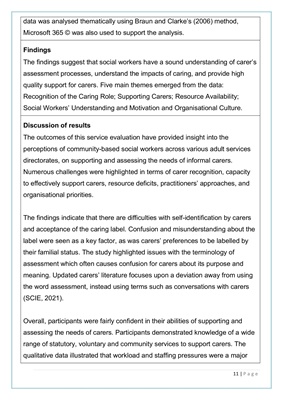
11 | P a g e
data was analysed thematically using Braun and Clarke's (2006) method,
Microsoft 365 © was also used to support the analysis.
Findings
The findings suggest that social workers have a sound understanding of carer's
assessment processes, understand the impacts of caring, and provide high
quality support for carers. Five main themes emerged from the data:
Recognition of the Caring Role; Supporting Carers; Resource Availability;
Social Workers' Understanding and Motivation and Organisational Culture.
Discussion of results
The outcomes of this service evaluation have provided insight into the
perceptions of community-based social workers across various adult services
directorates, on supporting and assessing the needs of informal carers.
Numerous challenges were highlighted in terms of carer recognition, capacity
to effectively support carers, resource deficits, practitioners' approaches, and
organisational priorities.
The findings indicate that there are difficulties with self-identification by carers
and acceptance of the caring label. Confusion and misunderstanding about the
label were seen as a key factor, as was carers' preferences to be labelled by
their familial status. The study highlighted issues with the terminology of
assessment which often causes confusion for carers about its purpose and
meaning. Updated carers' literature focuses upon a deviation away from using
the word assessment, instead using terms such as conversations with carers
(SCIE, 2021).
Overall, participants were fairly confident in their abilities of supporting and
assessing the needs of carers. Participants demonstrated knowledge of a wide
range of statutory, voluntary and community services to support carers. The
qualitative data illustrated that workload and staffing pressures were a major